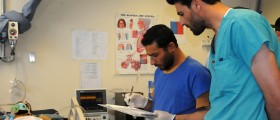
Psychiatrists are doctors who diagnose and treat mentalhealth disorders. Psychiatrists are medical professionals who have gone throughfour years of medical school and have completed residencies to specialize inpsychiatry. The psychiatric residency is a four year training program after whichmany individuals take licensing exams in order to be admitted into variouspsychiatric boards. Apart from diagnosing and treating psychological disturbances,psychiatrists may prescribe medications, hospitalize patients, interpret laboratoryand imaging results, such as CAT scans or MRIs, and perform psychotherapy. Apsychiatrist primarily helps clients change patterns of behavior, and resolve andovercome past issues through either individual, family or group sessions. Mostclinicians opt for combining intensive counseling sessions based on various paradigmsof psychotherapy, such as cognitive behavioral therapy, and medicationsappropriate for different psychological disturbances. Psychiatrists usuallywork in teams of specialists composed of other medical professionals,psychologists, nurses, and so on.
Psychiatrists’ Job Description
There are many subtypes of psychiatry. For instance, addictionpsychiatrist treats individuals suffering from drug and alcohol abuse. Adultpsychiatrists only deal with individuals who are of the age of the majority andtheir mental illnesses. Organizational or occupational psychiatrists can befound in the workplace, whereas geriatric psychiatrists only deal with seniors.Neuropsychiatrists specialize in treating illnesses that stem from the brain oraffecting the brain or the nervous system. Many neoropsychiatrists treatdisorders such as Alzheimer’s or dementia. Forensic psychiatrists work with lawenforcement and treat offenders for various mental disorders whereas child andadolescent psychiatrists deal with children and young adults. Any kind ofmental disorder can be treated by a various type of psychiatrist, from sexualand eating disorders to post-traumatic stress or obsessive compulsivedisorders. In addition, psychiatrists who work in busy settings can often spendclose to 60 hours a week at work due to the fact that they are constantlyavailable to their patients, even during the night. In some cases,psychiatrists have to handle violent or aggressive individuals. Training inpsychiatry is one of the most demanding ones of any profession, but theearnings are among the highest as well. Psychiatry is a profession that isfairly in demand, especially in low income areas or rural settings, but thereare period shortages in various areas and workplaces. Further, mostpsychiatrists spend more than 60 percent of their working hours dealingdirectly with patients, while the rest of the time is spent on teaching, providingconsultations, or doing administrative work. A psychiatrist working in a hospitalsetting spends the most of his time assessing, diagnosing, and treatingpatients with acute mental disorders. Those working in private practice withother colleagues are more likely to be providing psychotherapy, meeting andassessing new clients, and doing paperwork. Moreover, many surveys predict ahigher than usual demand for mental health professionals as the awareness ofthe general population of such problems is on the rise. Others describepsychiatry as a field with where there are shortages, further indicating thatthe profession has many prospects.
Level of Education for Psychiatrists
In order to become a psychiatrist in Canada or the US astudent first has to complete a bachelor’s degree in any field, but has to takesome prerequisite courses necessary for medical school application. Moststudents Aspiring to go to medical school major in biology, physics, organicstudies, or mathematics, while many volunteer at hospitals to gain someprofessional experience. Upon completion of the basic studies, interestedindividuals then enroll in medical school, and spend four years earning a M.D.or a D.O. degree. In order to specialize in psychiatry, students then enter theresidency programs which last four or five years. During residency, individualsare trained in all aspect of the profession, from assessing and diagnosing, totreating, and preventing mental disorders. Prospective psychiatrists alsoreceive training in psychodynamic, cognitive behavioral and supportivepsychotherapy. Many graduated psychiatrists go on to complete various boardexaminations, obtain licenses and certificates. On the other hand, in theNetherlands, students enter a six year medical school after high school, wherethey earn the title of a ‘master of medicine’, or a medical doctor. After the completionof medical school students go on to specialize in psychiatry by completing a 4year program, with additional 2 more years for a child or adolescentpsychiatrist. In the UK, after completing a medical degree, prospectivepsychiatrists work as Foundation House Officers for one year, after which theybecome medical professionals. The specialization process is divided into twoparts, and those are the Basic Specialist, and the Higher Specialist. The BasicSpecialist is in training for three years, after which he or she takes a boardexam. When entering the Higher Specialist stage, candidates choose a subspecialisationof psychiatry, such as child or an occupational psychiatry. The HigherSpecialization program lasts for three years after which the candidates receivea Certificate of Completion.

















Your thoughts on this
Loading...